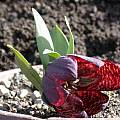Fritillaria that originate in Asia from l-r are described on this page. For information about other species consult the links below.
Asian fritillaria a-c - Asian fritillaria d-k - Asian fritillaria s-z - European fritillaria a-o - European fritillaria p-z - Fritillaria index - Miscellaneous fritillaria - North American fritillaria a-l - North American fritillaria m-z
Fritillaria latifolia Willd. is distributed in northeast Turkey, Caucasus, and northwest Iran, growing to about 30 cm tall. Photo 1 by Jane McGary shows it flowering in February in a bulb frame in Oregon. The pictured plant was grown from seed purchased from Archibalds under number 498.205 "ex R. & R. Wallis 93A-48," said to originate in Gumushane, Turkey. All English descriptions, including that in the Archibald seedlist, refer to "glossy green" leaves, and this specimen has glaucous leaves, as well as a slightly deformed flower with some abortive extra tepals inside. However, the 2004 catalog of Janis Ruksans illustrates a glaucous-leaved F. latifolia wild collected in the Caucasus, so perhaps this characteristic is variable. Photos 2 and 3 by Oron Peri are of the species in habitat in Georgia, including a rare green form.
Fritillaria michailovskyi Fomin is a native of Turkey that grows in alpine turf near the snow line. It has brownish-purple flowers with the lower third bright yellow. Height range: 4-8 cm. Photos by Arnold Trachtenberg and John Lonsdale.
Seed photos by David Pilling, the second was taken using transmitted light, and the third 31 days later after the seeds had been exposed to moisture and cold (32-40 °F), it can be seen the embryos have developed, see Fritillaria Germination. The final photo was taken after a further 49 days and shows seeds germinating.
Fritillaria minuta Boiss. & Noë is from east Turkey where it grows on stony slopes. It has reddish-brown or orange solitary pendant flowers and bright shiny green leaves. Height range: 10-20 cm. Photos by John Lonsdale.
Fritillaria pallidiflora Schrenk ex Fisch. & C.A.Mey. is a native of central Asia with grey leaves and bells of pale yellow. Height: to about 60 cm. Photos by Arnold Trachtenberg and John Lonsdale.
Grown from Holland bulbs offered in the autumn, this is a delicate beauty, with nicely proportioned pastel yellow blooms, elegant in countenance, and externally speckled in green. It survived a couple of years, then was lost due to rodent predation. Generally available in the autumn where Holland bulbs are sold, inexpensive, and well worth growing in an open shaded spot. First photo by Mark McDonough; remaining photos by David Pilling starting with bulbs received from Holland; next photo, plants in a 7 cm pot.
Fritillaria persica L. has a large range from S. Turkey to western Iran, south to Jordan and Israel, and is quite variable. Height range: 15-100 cm. Pictured are seedlings of the clone 'Adiyaman', which duplicate that clone's unusually large, deep purple flowers. (Bulbs now sold as 'Adiyaman' often are an inferior seedling strain with small brownish flowers, which is, however, a more tolerant garden plant.) These very tall frits require excellent drainage; in Oregon, where these were photographed, these large-flowered ones do better in a bulb frame, while the commercial strain does well outdoors. A white form is shown in the following entry. Photo by Jane McGary
Photos of unrelated commercial bulbs by David Pilling (the coin is about an inch in diameter); both shoots are from one bulb. Two things about Fritillaria bulbs which can be difficult to believe are that they have a hole through them, and a new bulb forms each year to replace the old one. Photo 3 shows development in Autumn, with a new bulb forming around the shoot; the green stick has been inserted through the hole in the original bulb. Photos 4 and 5 show flowers in Spring.
Fritillaria persica 'Ivory Tower' photo taken at Floriade 2002 by Bill Dijk.
Fritillaria pinardii Boiss. is native to the eastern Mediterranean, especially to Turkey. It grows to about 20 cm. It is quite variable; the first three photos from Jane McGary show a typical population grown from wild-collected seeds from Armenia, a golden yellow form from another Turkish wild collection, and forms with rich copper-colored interiors (also Archibalds). It is easily grown from seed. These plants are in a bulb frame in Oregon, flowering in March; they are kept somewhat dry but not arid in summer. The last two photos were taken by Ian Young.
A species formerly known as Fritillaria zagrica Stapf in 2025 is considered to be a synonym of Fritillaria pinardii ssp. pinardii. It is described as a short species (4- 12 cm) native to the Zagros Mountains of Iran and Turkey where it grows as a snow-melt species at very high altitudes. It has dark chocolate-purple flowers with yellow tips. You can still find information about it online under its previous name. Photos by John Lonsdale.
Fritillaria reuteri Boiss. is from Western Iran, north and west of Isphahan, in rocky meadows at 2500-3000 m. The species' native habitat is wet at flowering time, dry in summer. It grows to 15-25 cm with shiny green leaves. In colour the flowers are similar to F. michailovskyi but they are arranged on a much taller stem and the tepal tips are incurved (not flared); it is more floriferous than the typical michailovskyi. Photos by Ian Young
Asian fritillaria a-c - Asian fritillaria d-k - Asian fritillaria s-z - European fritillaria a-o - European fritillaria p-z - Fritillaria index - Miscellaneous fritillaria - North American fritillaria a-l - North American fritillaria m-z







































